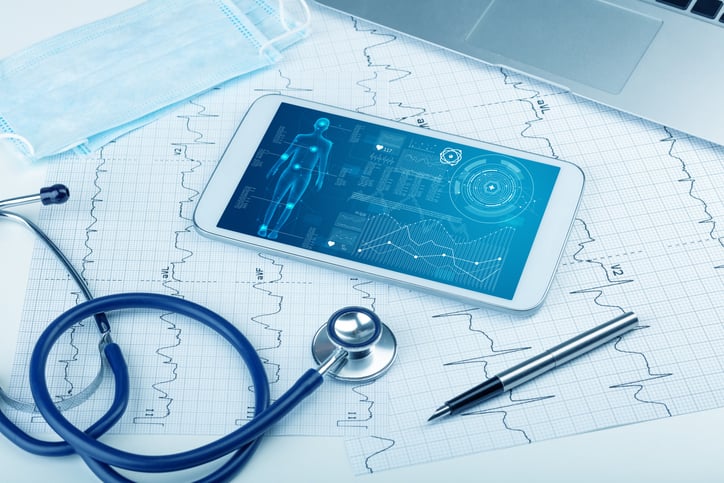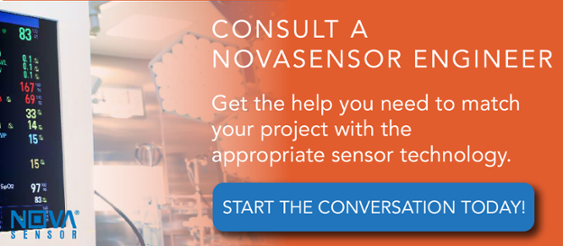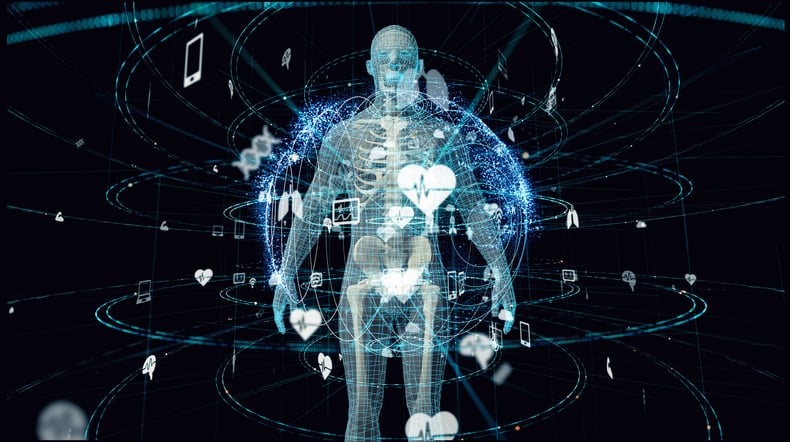Smart Medical Devices & Sensors: How Tech Is Transforming Healthcare

Some devices in medicine have withstood the test of time, the stethoscope is a prime example. While the medical listening device has seen some nominal updates, the stethoscope remains relatively unchanged for 70+ years.
However, times are changing – and changing quickly. The medical device industry is not immune to one of the latest technological advances impacting all industries: smart technology. The introduction of “smart” devices in patient care have greatly increased both efficiency and precision.
But like their less advanced predecessors and counterparts, smart devices only go so far as their components take them. Among the smallest and most important: sensors. Paired together, smart medical devices and sensors create new ways to specialize and perfect health care.
What Makes Medical Devices ‘Smart’?
Smart medical devices are machines, instruments, and equipment that use AI or machine learning algorithms to gain insight into patient treatment and outcomes. Smart technology has propelled e-health initiatives by facilitating real-time remote patient monitoring, greatly reducing doctor visits and hospital readmissions.
Smart medical devices typically fall into two categories:
-
Informational devices: Designed to collect and display health data for patients to use in making informed decisions. These devices include wearable fitness trackers, smart scales, and blood glucose monitors. Patients can use this information to track their progress toward their health goals, make lifestyle changes, and share their data with healthcare providers.
-
Automated health management devices: These actively manage a patient's health by providing real-time feedback and recommendations. These devices use artificial intelligence and machine learning algorithms to analyze health data and provide personalized insights and recommendations to improve health outcomes.
How Smart Technology is Revolutionizing Healthcare
Smart technology, equipped with custom sensors, is upgrading a wide variety of medical devices across all facets of patient care. This advancement allows healthcare to become more mobile, convenient, and personalized than ever before – all while upholding the highest standards of accuracy and performance.
A few key examples include:
-
Glucometers and insulin pumps
-
Ambulatory dialysis
-
CPAP machines
-
Blood pressure monitors
1. Glucometers & Insulin Pumps
Smart technology helps insulin pumps provide more accurate and precise dosages of medication to diabetics, allowing them to better manage their conditions. Smart technology can be incorporated into the design of insulin pumps using sensors and advanced algorithms to measure glucose levels, metabolic rates, body temperature, heart rate, and other health metrics.
This informative data is then transferred to the pump, allowing it to adjust medication dosage accordingly. This ensures that patients receive their medications in an optimal manner and, most importantly, at the right time.
2. Ambulatory Dialysis
Traditionally, dialysis treatments meant the patient needed to travel to a medical facility for treatment. While that scenario still plays out every day, smart technology is allowing for the life-prolonging treatment to happen in-home. This helps reduce time spent on traveling, lowers medical expenses, and allows for more flexibility in terms of treatment times.
For example, smart dialysis machines are able to measure a variety of parameters such as blood pressure, fluid levels, and electrolyte levels. This data is monitored in real-time by the machine’s AI algorithms and is used to adjust the machine’s settings accordingly.
3. CPAP Machines
Used to treat sleep apnea, CPAP machines are increasingly being enhanced by smart technology to improve comfort and effectiveness. CPAP machines feature automated feedback loops that can constantly monitor and adjust treatments in real-time, which provides more tailored treatment regimens that are designed for individual, specific needs.
Additionally, CPAP machines equipped with smart technology can provide insights into the individual's sleep patterns and possible treatments for underlying medical issues.
4. Blood Pressure Monitors
Blood pressure monitors have undergone significant improvements with the integration of smart technology, making it easier for patients to track their health. One of the major advancements is the ability to wirelessly connect to smartphones or tablets through Bluetooth or Wi-Fi. Patients can easily transfer their blood pressure data to an app for analysis, tracking, and sharing with their healthcare providers.
Machine learning algorithms in smart blood pressure monitors are able to identify patterns and provide personalized recommendations for patients to improve their blood pressure management. Smart blood pressure monitors can also detect irregular heartbeats and alert patients to seek medical attention.
Custom Integrated Sensors Are the backbone of Smart Technology
Any piece of health care equipment is the sum of its parts – with smart medical devices, sensors are that critical component. While "off-the-shelf" sensors are available, custom sensors take performance to the next level.
To that end, an experienced OEM sensor manufacturer is worth its weight in gold to any medical device maker.
-
Expertise – OEM sensor manufacturers specialize in designing, developing, and manufacturing sensors for a wide range of applications. They have the expertise and knowledge needed to create sensors that are accurate and reliable in order to withstand the conditions of the environment they are intended for.
-
Customization - They can modify the size, shape, and performance characteristics of their sensors to fit the unique requirements of a particular application. This can result in better accuracy, lower power consumption, and improved reliability.
-
Integration – Working with an OEM sensor manufacturer can also make it easier to integrate the sensor into the smart device. The manufacturer can provide guidance on the best way to interface with the sensor and ensure that the sensor communicates effectively with the device's software and hardware.
-
Quality – They have strict quality control processes in place to ensure that their sensors meet the highest standards of accuracy and reliability. This means that the sensors used in the smart device will be of high quality, reducing the likelihood of device failure or malfunction.
-
Support – They can provide ongoing support throughout the development process and beyond. They can help with troubleshooting, provide technical support, and even offer training to help designers get the most out of their sensors.
Smart Medical Devices and Sensors Revolutionize Healthcare and Improve Patient Care
As in practically every industry, smart technology is revolutionizing medical devices and how they impact patient care. Allowing for real-time data analysis and continuous monitoring, smart medical devices and sensors are providing healthcare professionals with more accurate and timely information. As a result, sensors are paving the way for a more connected, patient-centered approach to medical care.
If you’re looking to pair your medical device design with an innovative sensor, consult with an expert engineer today.




